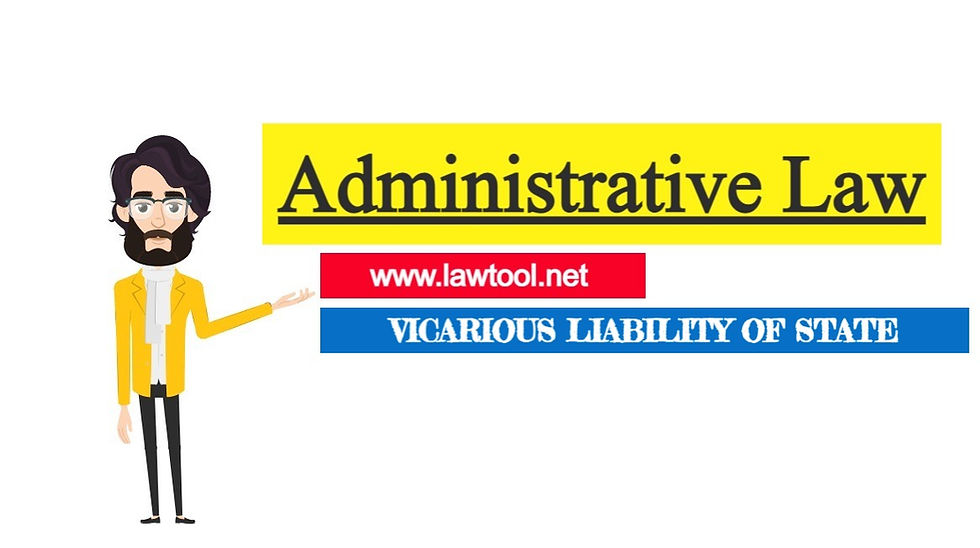VICARIOUS LIABILITY OF STATE
- www.lawtool.net

- Dec 26, 2021
- 4 min read
VICARIOUS LIABILITY OF STATE
Synopsis
Vicarious liability of State: Old England law
Vicarious liability of State: New England law
Indian law
Non-Sovereign functions
Sovereign functions Points
Vicarious liability of State: Old England law
King can do not wrong. Even if he does it was not wrong. State was not liable for torts committed by its servants. This kind of protection is called sovereign immunity. The wrongdoer was personally liable but not the State.
Vicarious liability of State: New England law
The crown proceeding Act, 1947 had changed the position and now the State is liable for the tort committed by its servants just like the private individuals In Home Office v. Dorset Yacht Co., 1970 2 All ER 294 HC, the bookstall trainees caused damage as escaped from custody due to the negligence of the bookstall officers. Crown was held liable.
Indian law
Article 300 of the Constitution of India deals with the liability of the State. The Govt. of India may sue and be sued in the name of the Union of India. The Govt. of the State may sue and be sued in the name of the state. In Peninsular and Oriental Steam Navigation Co. v. Secretary of State for India, 5 Bom HCR App 11. the servant of P & OSN Co. was driving a horse carriage on a highway in culcutta The Government servants were carrying a long iron chimney across the road. Due to the negligence of Government servants one of the horses was injured. The State was held liable Chief Justice Peacock further held that for sovereign functions the State is not liable and for non-sovereign functions the State is liable.
Non-Sovereign functions
RUP Ram v. the Punjab State
Rup Ram was injured due to rash and negligent daiving of a Government truck was a non-sovereign. Hence, the State was held liable. In Vidyawati v. Lokumal, AIR 1957 Raj 305, the husband of Vidvawati died due to rash and negligent driving of a Government jeep was a non-so vereign function. Hence, the State was held liable.
State of Punjab v. Lal Chand Sabharwal, AlIR 1975 P&H 294, some persons were arrested during save Hindi agitation. Theywere being transported in a bus. The driver of bus caused accident negligently and injured the Plaintiff. The act of driver was a non-sovereign function. Hence, the State was held liable.
State of Rajasthan v. Vidyawati, AIR 1962 SC 933, the Collector's jeep returning after repairs from a workshop killed the Plaintiff husband died in the accident caused by collector's jeep on its return from workshop after repair. The High Court held that the State was liable. Because returning from workshop was a non-sovereign function it has been observed that the State should not claim immunity from liability in the welfare state.
Sovereign functions
State of Orissa v. Padmalochan, AIR 1975 Orissa 41, lathi-charge by police caused injured the Plaintiff. It has been held that lathi charge was a sovereign function and the State was not liable.
In Kasturilal v. State of U.P, AIR 1965 SC 1039, the Meerut police arrested Kasturilal, a gold businessman. The 103 tulas of 2 mainds with his gold and of silver wrongfully on mere suspicion. The Gold was kept in police locker under the charge of Mohammad Amir, a head constable. The head constable had stolen the gold and went to Pakistan. It has been held that the State was not liable because custody of property in the police station was a sovereign function. Therefore the Government was not responsible.
Rane Ghulam v. Govt. of U.P, AIR 1950 All 206, the police recovered Stolen property and the same was kept in police custody. Again it was stolen from police custody. The owner sued for compensation. High Court of U.P followed Kasthuri Lal's case and held that the State was not liable. In Pagadala Narasimham v. The Commissioner and Special Officer, Nellore Municipality, Nellore, AIIR 1994 AP 21, the Plaintiff's bus was wrongly parked. The traffic police and servants of the Municipality removed it. It has been held that removal of a wrongly parked vehicle was a sovereign function and therefore State was not liable.
Rudul Shah v. State of Bihar, AIR 1983 SC 1086, Rudul Shah was acquitted in 1968, but he was wrongfully detained in the jail for 14 years. Supreme Court ordered for immediate release and awarded compensation of Rs. 35,000. Thus, the State was held liable,
In Saheli v. Commissioner of Police, Delhi AIR 1990 SC 513, the police caused the death of 9 years old Naresh. Saheli, a Women's Resource Centre filed a writ petition. Supreme Court awarded Rs. 75,000 to the mother of the child. Therefore the State was held liable.
Bhim Singh v. State of Jammu and Kashmir, AIR 1986 SC 494, the police wrongfully detained Bhim Singh, an MLA. He could not attend the assembly session. The Court awarded Rs. 50,000 as compensation. In N. Nagendra Rao & Co. State of AP, 1994 6 SCC 205 It has been held that the State was liable vicariously for the negligence committed by its officers in discharge of pubic duty conferred on them under a Statute. The State cannot claim any immunity during the functions of constitutional Government.
State of AP v. Challa Ramakrishna Reddy, AIR 2000 SC 2083, This case is popularly known as 'prisoner's murder case'. A prisoner informed the authorities of the jail about the apprehended danger to his life, but the authorities on this information took no action. No measures were taken for his safety and he was killed in the prison. It has been held that in the case of violation of fundamental rights, the defense of Sovereign Immunity couldn't be accepted. Therefore, the Government and the police are liable to pay compensation.










Comments